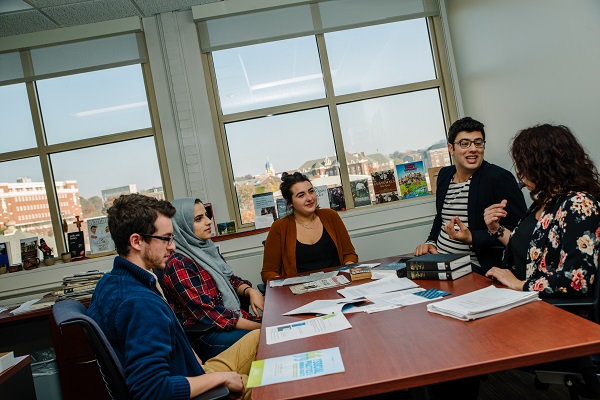University Libraries

Collaborating for Better Student Research Papers
By Heidi Gauder
The research assignment was unusual: Write a white paper convincing a mock congressional committee that your stakeholder group has the best policy solution for hydraulic fracturing, popularly known as “fracking.” To be successful, students had to understand existing government regulations, articulate the politics of their chosen stakeholder, then present a research-based position that also anticipated counter-arguments.
Such was my introduction to Michelle Pautz’s POL371 course, Environmental Policy.
“I often use simulations in my courses to more actively engage students in concepts and materials and to achieve learning goals I have for them,” Pautz said. “Over various semesters, I have employed the congressional hearing simulation, and while I had made lots of progress on the logistics and mechanics, I have struggled getting the various student stakeholder groups to gather information of quality for strong policy arguments.”
So she turned to the library for help. As the political science department’s subject liaison, I’m familiar with a wide range of information resources available to our students and faculty, and I’m always looking for opportunities to teach people how to use them. Working together, Pautz and I clarified her goals for the project and developed a session and a follow-up workshop focused on the role of information in persuasion and the kinds of experts and information sources that make up a foundation for a solid argument.
I based the session on the Association of College & Research Libraries’ Framework for Information Literacy — specifically, the frame “Authority is constructed and contextual.” The research session took place just as students finished reading Tom Wilber’s 2012 book Under the Surface: Fracking, Fortunes, and the Fate of the Marcellus Shale (Cornell University Press), a journalistic narrative on fracking. Because this text uses multiple sources, it presented a perfect opportunity for students to analyze the use of different types of information to construct persuasive arguments.
After their analysis, the students brainstormed research needs for their own work — which segued directly into a lesson on search techniques and library databases, much of which was available for their later use in an online research guide.
In thinking about how information can be used strategically and analyzing what authority means in a given context, students were more purposeful in identifying relevant sources, Pautz said, and the results were impressive: They made stronger policy arguments using statistics, government regulations, newspapers, nonprofit websites, trade association websites, and materials from other scholars, companies and agencies associated with this issue.
“Working together,” Pautz said, “we fostered a better learning opportunity for our students.”
To read more about the collaboration, see “Undergraduate Research Needs: Faculty-Librarian Collaboration to Improve Information Literacy in Policy Papers” in the October issue of Journal of Public Affairs Education; it's available for download on eCommons.
— Heidi Gauder, professor and coordinator of research and instruction
